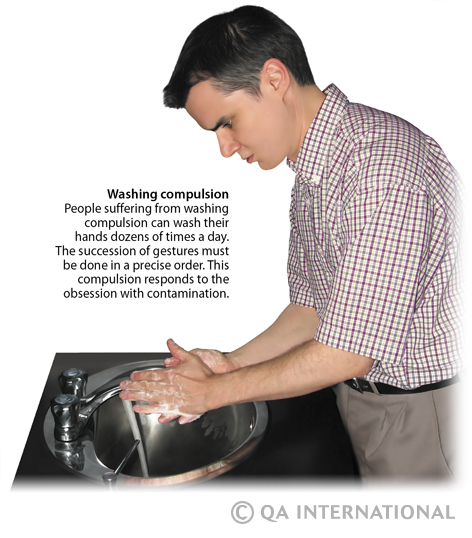Neurosis
People suffering from neurosis have abnormal behavior of which they are conscious, but they cannot change. This psychological disorder, due to an imbalance in the release of neurotransmitters, disturbs affective life without compromising intellectual faculties. Contrary to psychosis, there is no loss of contact with reality. Neurosis is specific to each afflicted individual, but there are characteristic symptoms allowing its diagnosis: relational difficulties, anxiety, sense of ill-being, compulsions, obsessions, phobias, sexual disorders, etc. Certain forms of neurosis constitute a severe social handicap and can cause depression, even suicide.
Obsessive Compulsive Disorder (OCD)
Obsessive Compulsive Disorder (OCD), or obsessional neurosis, is a neurosis characterized by the presence of obsessions and compulsions. These symptoms exert a strong constraint on afflicted individuals, who dedicate a lot of energy to them. They recognize the absurd nature of their behavior, but cannot change it. OCD generally begins during adolescence and is frequently associated with other mental disorders such as depression, phobias, anorexia, schizophrenia or affective dependence.

Generalized anxiety disorder
Generalized anxiety disorder, or anguish neurosis, is a form of neurosis characterized by permanent anxiety (constant worry and alarm, preparation for the worst). In addition, sometimes there can be sudden attacks, during which the afflicted individual has the impression of becoming crazy or dying and presents physical symptoms: intestinal spasms, acceleration of heart rate, sweating, sensation of oppression, tremors, drying of mucous membranes. Generalized anxiety disorders most often affects women and young adults.
Phobias and phobic neurosis
A phobia is an intense fear triggered by an object or situation which is not, objectively, dangerous in itself. There are several types: phobias related to space (agoraphobia, claustrophobia), social phobias (fear of situations in which one is observed or judged), specific phobias such as fear of certain animals, transportation, natural elements, blood, certain situations, etc. A phobia is a symptom of numerous psychiatric diseases and is the dominant symptom of phobic neurosis. Afflicted individuals experience a paralyzing, uncontrollable and incoercible fear facing the object or the phobic situation. In a constant state of alarm, they devise ways to avoid being in contact with the object of their phobia. They can also use fetish objects that, by their presence, allow them to reduce their anxiety and confront the phobic situation.
The most common phobias are social phobias and those related to spaces. Other specific phobias are also widespread, such as the fear of spiders (arachnophobia), dogs (cynophobia), snakes (ophiophobia), water (aquaphobia), strangers (xenophobia), flying (pteromerhanophobia) and heights (acrophobia).




